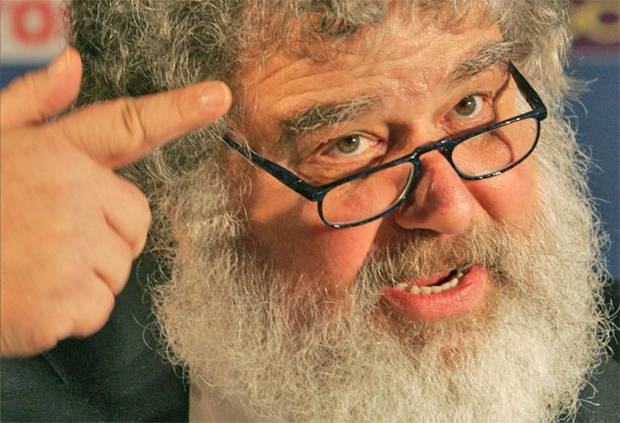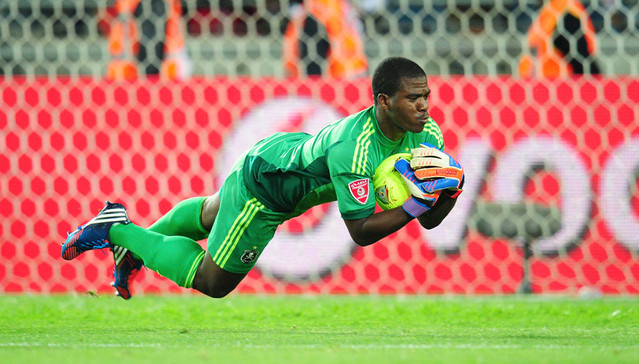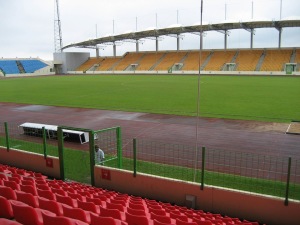
The Confederation of African Football has announced that Equatorial Guinea will replace Morocco as host nation for the 2015 African Nations Cup, the continent’s oldest and most prestigious international tournament.
The decision followed “fraternal and fruitful discussions” between CAF and Equatorial Guinea’s President Obiang, according to CAF’s official statement. Matches will be played in Malabo, Bata, Mongomo and Ebebiyin. The draw is scheduled for December 3 in Malabo.
The oil-rich former Spanish colony, population 736,000, previously co-hosted the tournament, with Gabon, in 2012.
CAF’s announcement brought a controversial and increasingly tense saga to a close. Morocco’s decision to back out of its commitment to stage the Nations Cup came in the wake of the Ebola outbreak in West Africa. The North African nation’s withdrawal drew passionate criticism from many fans and observers in Africa and overseas.
Writing for The Guardian’s Comment is Free, Sean Jacobs (the South African founder of the Africa Is A Country website) argues that “a mix of politics, opportunism and self-interest seem to be behind Morocco’s decision.”
The incident, Jacobs explains, is evidence of Morocco’s “difficult relationship with nations south of the Sahara. African migrants, some on their way to Europe, regularly complain about harassment, violence and xenophobia.”
James Dorsey’s The Turbulent World of Middle East Soccer blog took a similar tack. “Morocco can’t escape the impression that its decision was informed by prejudice,” especially within the context of a long and complex history of economic, cultural, and political relations between North African countries and sub-Saharan African nations. And, of course, fear shaped the decision as well. Fear, specifically, “about the possible impact of an Ebola case on tourism that accounts for an estimated ten percent of Morocco’s gross domestic product.”
Morocco’s seemingly contradictory decision not to host the Nations Cup in January but to go ahead and stage the FIFA World Club Cup next month sparked more criticism.
In the end, Africa’s grandest football show will go on thanks to Issa Hayatou, CAF’s president for the past 26 years, and President Obiang, Africa’s longest serving autocrat–in power since 1979 and at the head of the ruling Democratic Party of Equatorial Guinea that holds 153 of 155 parliamentary seats.
This last-minute African Nations Cup resolution reminds me of FIFA General Secretary Jerome Valcke’s statement during the massive 2013 Confederations Cup protests in Brazil: “less democracy is sometimes better for organizing a World Cup.” And, in this case, it seems to work for an African Nations Cup too.
Author: Peter Alegi
This week my senior history seminar “Race and Power in South African Sport” is discussing the gripping story of the Makana Football Association, the league formed by prisoners on Robben Island, apartheid’s most notorious prison. Students read More Than Just a Game: Soccer vs. Apartheid—The Most Important Soccer Story Ever Told by Chuck Korr and Marvin Close. We also watched the film by the same title, which preceded the book version of the story.
Students blog weekly about the readings as a way to reflect on the assigned material and spark discussion. “As a soccer player myself,” wrote one blogger, “the true story of what materialized on Robben Island is one of the most thought-provoking and uplifting stories I have ever come across.”
Another student blogger highlighted the role of football in bringing older and younger inmates closer together in the wake of the 1976 Soweto Uprising. The shifting demographics of the prison population sparked tensions, but eventually “The younger generation saw the quality of football that was played on the island and began to appreciate the skill and cunning that had gone into building the MFA. ‘As mutual respect began to grow, the older prisoners would sit in the quarry during lunch breaks, gaze out towards Cape Town and the mainland, and quiz the new inmates about the progress of their favourite clubs. They particularly wanted to hear about the exploits of a new black ‘super club’- the now world-famous Kaizer Chiefs’” (Korr and Close 235).
Finally, another blog post relied on a Soweto-era Robben Islander, “Patrick Lekota, who would eventually become South Africa’s Minister of Defense [. . . to sum] up the game’s importance: “Without it, we would have been so depressed. It took our mind away” (Korr & Close 234). This blog also featured the extraordinary 2010 episode of ESPN “Outside The Lines” on Robben Island football posted above. Watch. Learn. Enjoy. Share.
For a quarter century Chuck Blazer was the most powerful soccer administrator in the United States and CONCACAF. He was a member of the FIFA Executive Committee from 1996 to 2013. Investigative journalist Andrew Jennings revealed in 2011 that Blazer was under FBI investigation for tax evasion. Thanks to a devastating, detailed report by The New York Daily News published this weekend, we now also know that Blazer became an FBI informant. (Click here for full text.)
In doing so, U.S. authorities sought to gain “a rare window into the shadowy financing of international soccer, a world notorious for its corruption and lavish excess,” the Daily News reports.
Blazer’s debauchery is legendary, as this blog has highlighted in the past. But the Daily News presented new evidence documenting how he “failed to pay income taxes for more than a decade while hauling in tens of millions of dollars, a discovery the feds used to threaten him with prosecution and convert him into a cooperating witness.” The newspaper provides fresh evidence of Blazer’s misallocation of funds and misuse of assets belonging to CONCACAF. He went so far as to run up $29 million in credit card charges. Damning proof, it is alleged, that Blazer was “intoxicated by power and cash.”
The 69-year-old soccer official, now dying of colon cancer, “lived like there was no tomorrow,” emboldened by global football administration’s modus operandi—one that makes “you feel like you’re the king of the world,” one source told the Daily News; “And it’s all for soccer.”
***
Addendum (11/6/2014): Listen to “Beyond The Pitch” podcast “dissect and tell the story behind the tale that is titled Mister Ten Percent, Chuck Blazer, a lengthy piece that digs deep into his background and explains how a soccer dad from New York rose to the dizzying heights of world football royalty, how he climbed the ladder armed with ambition and ingenuity and what led to his fall as fresh reports in New York media suggest that he is now cooperating with federal authorities.”
Just two days after former 800m world champion Mbulaeni Mulaudzi died in a car crash, South Africa mourns the death of another sport celebrity. 27-year-old Senzo Meyiwa, captain of Orlando Pirates and South Africa, was shot and killed on Sunday evening during a robber at his partner’s home in Vosloruus, East Rand.
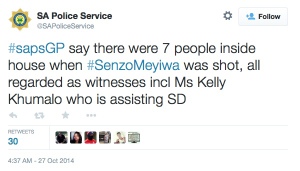 According to initial reports, two armed men entered the home of actress and singer Kelly Khumalo and demanded cash, cell phones, and valuables from seven people. An altercation ensued and one of the assailants shot Meyiwa once in the chest. The player was pronounced dead on arrival at the hospital.
According to initial reports, two armed men entered the home of actress and singer Kelly Khumalo and demanded cash, cell phones, and valuables from seven people. An altercation ensued and one of the assailants shot Meyiwa once in the chest. The player was pronounced dead on arrival at the hospital.
Kick Off magazine reported on its website that “News of the shooting prompted widespread sympathy on social media and condemnation of South Africa’s rampant gun violence.”
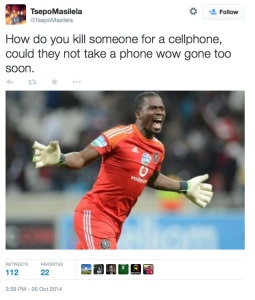 Tsepo Masilela, a Bafana Bafana teammate of Meyiwa’s, seemed to capture the shock of many when he tweeted: “How do you kill someone for a cellphone?”
Tsepo Masilela, a Bafana Bafana teammate of Meyiwa’s, seemed to capture the shock of many when he tweeted: “How do you kill someone for a cellphone?”
The South African Police Service (@SAPoliceService) offered a R150,000 reward for information leading to an arrest.
Chris Thurman, an academic and editor of Sport versus Art, summed up the horrible past days for sport in South Africa via Twitter: “RIP Mbulaeni Mulaudzi & Senzo Meyiwa. Men who offered South Africans two of the best features of our story, struck down by two of the worst.”
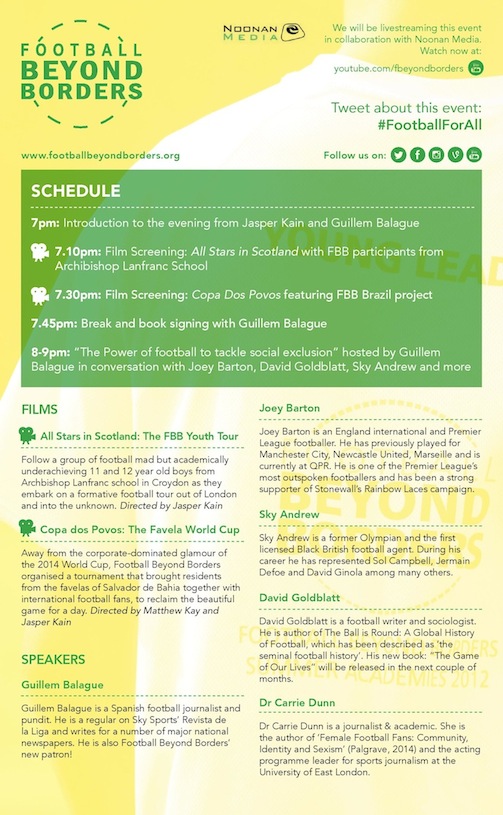 On Thursday, October 23, Football Beyond Borders, a London-based non-profit organization, is hosting a panel discussion on the power of football to combat social exclusion. It features author, journalist and tv pundit Guillem Balague, award-winning writer David Goldblatt, Premier leaguer Joey Barton, sports agent Sky Andrew, and other special guests. The event is part of the FARE network #FootballPeople action weeks.
On Thursday, October 23, Football Beyond Borders, a London-based non-profit organization, is hosting a panel discussion on the power of football to combat social exclusion. It features author, journalist and tv pundit Guillem Balague, award-winning writer David Goldblatt, Premier leaguer Joey Barton, sports agent Sky Andrew, and other special guests. The event is part of the FARE network #FootballPeople action weeks.
Two new documentaries about Football Beyond Borders’ work in the UK and Brazil will also be premiered. Copa dos Povos is about the international Favela World Cup that took place in Brazil in the summer; and All Stars in Scotland: FBB Youth Tour, which follows the first ever FBB school tour to Scotland.
The event is at Amnesty International’s East London HQ from 7pm until 10pm, with food and drinks available. Tickets are sold out but you can watch a livestream of the event on the FBB YouTube channel.
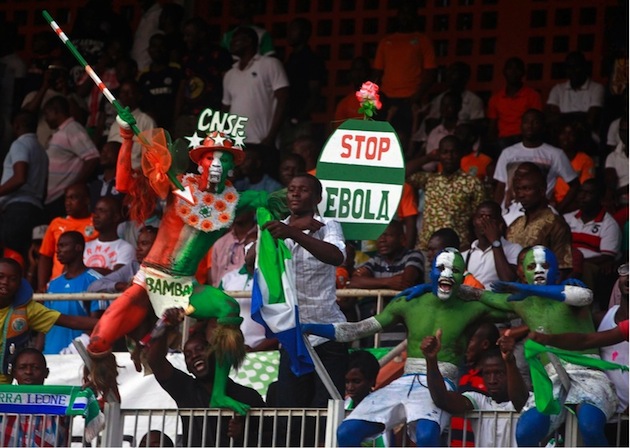
Spectators went beyond the usual gamesmanship at Sierra Leone’s practice in Yaoundé, Cameroon: chants of “Ebola, Ebola” rained on the visitors. “You feel humiliated, like garbage, and you want to punch someone,” said John Trye, a reserve goalkeeper, speaking to Jeré Longman of The New York Times (click here to read the article).
Two months ago, Sierra Leone had reached number 50 in FIFA’s world ranking–an excellent result for a country ranked 183rd in the Human Development Index. Coached by Johnny McKinstry, an ambitious 29-year-old from Belfast, the team seemed poised to qualify for the 2015 African Nations Cup before the catastrophic Ebola outbreak in West Africa.
The Confederation of African Football decreed that Sierra Leone’s Nations Cup home qualifiers had to be played outside the country. When the team journeyed to Lubumbashi, Democratic Republic of Congo, to play a “home” match against the DRC, midfielder Khalifa Jabbie reported that “they treated us like aliens.” In Abidjan, the Ivory Coast players opted for fist-bumps with their opponents instead of shaking hands; fans in the stands taunted the visitors with “Stop Ebola” signs and insulting chants (see photo above).
Already facing stiff competition in a qualifying group that includes Ivory Coast and Cameroon, the itinerant Sierra Leoneans lost matches and became demoralized. “The players tried their very best but sometimes what the mind’s willing to do, the body simply can’t anymore,” said their Irish coach. Making matters worse, a couple of weeks before Sierra Leone’s away match in Cameroon, McKinstry was fired with a curt email from the sports ministry, which then fought publicly with the country’s Football Association over the selection of his successor.
While Sierra Leonans have much more serious matters to deal with than sport, the stigma and fear associated with Ebola is also denying emotional solace to a nation generously endowed with football passion and patriotism. As their new coach, Atto Mensah, put it, “This is the only way we can make people happy. We owe them joy.”
“Last Week Tonight” host John Oliver explains soccer and society in England to David Letterman.
The rich win. The poor lose. And most Americans don’t care.
Except, of course, those of us who screeched about John getting the number of EPL teams wrong. Enjoy!
